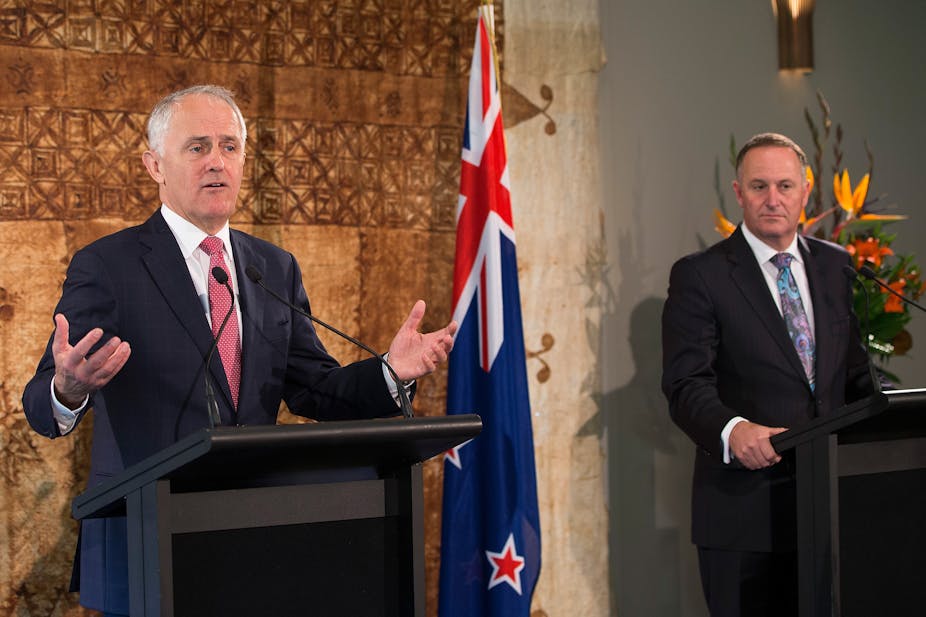Does New Zealand have a more realistic view of its strategic environment than Australia? Given that many hard-headed Australian strategists think that New Zealand freeloads on Australia’s security efforts, even raising such a question will strike many as preposterous.
And yet it’s worth thinking about what price our cousins across the Tasman have paid since they effectively gave up the pretence of being a “serious” military power and an effective ally of the US. Has a queue of hostile powers formed off the coast of a defenceless New Zealand now that they finally have a chance to put their long-held invasion plans into practice?
Clearly, the very idea is risible. It’s equally improbable for Australia. But unlike the Kiwis, we are about to spend a possible A$30-40 billion on new submarines, and something like $25 billion on F-35 fighter planes that are plagued with problems. The only thing certain about either of those projects is that they’ll cost significantly more than we were originally promised.
But even if the new hardware actually works as promised, what good will it actually do us? Is it actually possible to make a plausible argument for that sort of spending at a time when most public expenditure is under intense review and the economy is experiencing mounting problems?
That’s one of the many things that sets security questions apart. Unlike other areas of government spending, the defence of the realm remains relatively immune from funding cutbacks. On the contrary, at a time when security has become something of a national and international obsession, suggesting that the same sort of cost-benefit analysis ought to be applied to defence as other government portfolios looks foolhardy and even unpatriotic.
But is it? Perhaps the most remarkable feature of the defence debate is that there isn’t one. Despite the eye-watering sums involved – which the country apparently can no longer afford – there’s been next-to-no discussion of their actual necessity or the circumstances in which the planes, subs and other assets might actually be used.
The only questions about the new acquisitions, it seems, are: how many and who should build them?
Even the ALP toes the national security line. No-one wants to look wimpy, irresponsible or unreliable when it comes to defence. On the contrary, some Labor luminaries like Kim Beazley have been at the forefront of championing defence issues generally and the alliance with the US in particular – an enthusiasm that culminated in the ill-fated decision to commission the Collins-class submarines.
Despite those boats seemingly spending more time out of the water than under it, the nation’s safety didn’t seem to be noticeably impaired. In reality, the only real security threats Australia has faced over recent years have been from terrorism and illegal boat arrivals – if the latter actually is a security threat as such. It’s not obvious what even effective submarines and fighter planes could do about either of those problems.
Plainly the world is not a peaceful place. Australians’ security is occasionally threatened by those that would like to do them harm. Good intelligence and a capacity to intercept unauthorised arrivals – be they asylum seekers or terrorists – are clearly valuable and appropriate assets that are entirely in keeping with the scale of the threats this country faces.
But what about our obligation to the notional guarantor of our security? It isn’t unrealistic or disloyal to suggest that the US will do whatever it sees as being in its national interest, whether or not this happens to coincide with ours. Australia should do likewise. If the US wants to contain, confront or abandon us to China they will do so for reasons that make sense to them.
The key point to emphasise in this context is that Australia can make absolutely no difference to the outcome – or even likelihood – of a possible conflict between the US and China, with or without our expensive new military hardware. In such circumstances, it’s an awfully expensive way of reassuring the Americans about our reliability as alliance partners.
That’s where the New Zealand experience becomes instructive. Not only have the Kiwis suffered no evident diminution to their national security since they left the ANZUS alliance, but they have concentrated their efforts and limited capabilities where they really might make a difference: in economic development. That New Zealand wasn’t any longer a formal ANZUS partner can also only have helped its successful conclusion of a trade deal with China well in advance of us.
Genuinely independent middle powers are actually attractive partners for friend and putative foe alike. They also have more potential diplomatic leverage than countries whose every move is an all-too-predictable reflection of, and supplement to, that of its principal ally.
Outsourcing effective responsibility for foreign and security policy to the US or anyone else wouldn’t be wise even if we could afford the obligations this involves. It looks even more indefensible, unnecessary and unproductive in the current environment. New Zealand’s experience suggests that Australia’s future defence direction is at least worth debating.
An earlier version of this post appeared in The Strategist.

